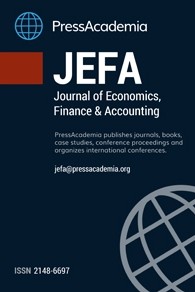MONEYBALL IN THE TURKISH FOOTBALL LEAGUE REVISITED: ANOMALIES IN GALATASARAY, FENERBAHCE AND BESIKTAS STOCK RETURNS DURING COVID-19 INCIDENT
Purpose - In this paper, we focus on the news impact analysis of the club stock returns. Galatasaray, Fenerbahçe and Beşiktaş stock prices skyrocketed in the last 3 months right after the suspension of leagued due to pandemic since they were not supported with the financial results of the clubs Methodology - We investigate the anomalies observed in the pandemic for three big football club stock returns by utilizing EGARCH models and News Impact Curves Findings- According to our EGARCH models we find that in Covid-19 period news impact persistency significantly increased for all three big club stock volatilities. Moreover, News Impact curves showed us in Covid-19 period the behavior of Fenerbahçe and Beşiktaş volatility changes. In the pandemic period after suspension of Turkish Football League bad news has more impact on Fenerbahçe and Beşiktaş stock volatility Conclusion- Since the leagues are suspended due to Covid-19 pandemic, and weak financial performances of all teams also do not support the stock price performances there is no fundamental explanation for this hike experienced in the last 3 months. This result confirms our first study conclusion which is sporting performances, excluding the unexpected wins, do not have any impact on the volatility of listed football clubs.
Keywords:
Turkish Football League, Covid-19, news impact curves, Tobin’s Q, Galatasaray Fenerbahce, Besiktas,
___
- Ashton, J.K., Gerrard, B. and Hudson, R, (2010), “Do National Soccer Results Really Impact on the Stock Market?”, Applied Economics, iFirst : 1-9
- Berument, H., M., Ceylan, N. B., Eker, G., Soccer, Stock Returns and Fanaticism: Evidence from Turkey, The Social Science Journal, 46, (2009), pp.594-600.
- Boido, C. Fasano, A. (2007), “Football and mood in Italian stock exchange”, The Icfai University Journal of Behavioral Finance, 4, pp.32-50.
- Cappiello, L., Engle, Sheppard, K., (2006), Asymmetric Dynamics in the Correlations of Global Equity and Bond Returns, Journal of Financial Econometrics, Vol. 4, No. 4, pp. 537–572
- Chen, X., Ghysels, E., (2010), News-Good or Bad-and Its Impact on Volatility Predictions over Multiple Horizons, The Society for Financial Studies, Oxford University Press.
- Demir, E., Daniş, H., (2011), The Effect of Performance of Soccer Clubs on Their Stock Prices: Evidence from Turkey, Emerging Markets Finance and Trade, 47(4), pp.58-70 (2011)
- Edmans, A., Garcia, D.and Norli O, (2007), “Sports Sentiment and Stock Returns”, The Journal of Finance. 62 (4), pp. 1967-1998
- Gerlach, J.R., (2011), “International Sports and Investor Sentiment: Do National Team Matches Really Affect Stock Market Returns?”, Applied Financial Economics, 21(12), pp.863-880
- Gökten, S., Karatepe, S. (2015), Effects of Match-fixing Related Publications on Football Clubs’ Stock Prices: An Example from Turkey, Muhasebe ve Finansman Dergisi, pp. 169-184
- Ulusoy, K., M. ve Ünlü, H. (2020). How Are Fenebahçe’s And Beşiktaş’s Stock Returns Reacted to The MatchFixing Announcement? Selçuk Üniversitesi Sosyal Bilimler Meslek Yüksekokulu Dergisi, 23 (1), 154-163.
- Nelson, B., D, (1991), Conditional Heteroskedasticity in Asset Returns: A New Approach, Econometrica, Vol. 59, No. 2., pp. 347-370
- Özdurak, C, Ulusoy, V., (2013) “Moneyball in the Turkish Football League: A Stock Behavior Analysis of Galatasaray and Fenerbahçe Based on
- Information Salience”, Journal of Applied Finance and Banking 3(4), 1-12.
- Renneboog, L. and Vanbrabant P., (2000) “Share Price Reaction to Sporty Performance of Soccer Clubs Listed on the London Stock Exchange and AIM”., Center for Economic Research, Working Paper, No:2000-19.
- Saraç, M., Zeren, F., (2013), Journal of Applied Finance & Banking, vol. 3, no. 5, pp. 299-314 ISSN: 1792-6580 (print version), Scienpress Ltd
- Stadtmann,G. (2006), “Frequent News and Pure Signals: The Case of a Publicly Traded Football Club”, Scottish Journal of Political Economy, 53, pp. 485-504
- Yayın Aralığı: Yılda 4 Sayı
- Başlangıç: 2014
- Yayıncı: PressAcademia
Sayıdaki Diğer Makaleler
PIIGS ÜLKELERİNİN BORÇ SORUNU VE PARASAL BİRLİK DÜZEYİNDE OLUŞTURULAN KURTARMA MEKANİZMALARI
TÜRKİYE’DE LOJİSTİK VE ULAŞTIRMA HARCAMALARI VE İHRACAT İLİŞKİSİNİN EKONOMETRİK ANALİZİ
Masoud GHAZAVİ, Sema Bayraktar TUR
Ciydem CATAK, Sena Yılmaz ARSLAN
ARAS VE MOOSRA YÖNTEMLERİNİN PERFORMANS SONUÇLARININ KARŞILAŞTIRILMASI: AMERİKA KITASI ÜLKELERİ
